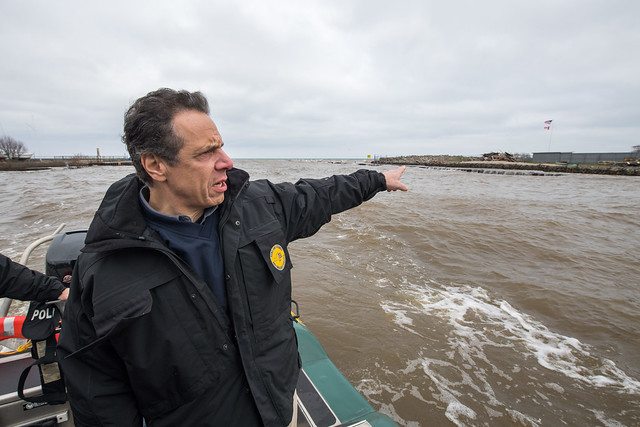
Gov. Cuomo (photo: governor's office)
As debate over the Green New Deal has seized the nation, the young people of Sunrise Movement have been challenging politicians to answer a simple question: What is your plan?
In April, the New York City Council rose to that challenge with a series of bills that sets a high-water mark for urban climate action across the globe. Mayor de Blasio is expected to sign the Climate Mobilization Act soon.
Governor Cuomo, meanwhile, has allowed the Climate and Community Protection Act (CCPA), the most ambitious climate legislation in the country, to languish in Albany. “I don’t see anything specific for the rest of the session” in terms of environmental legislation, the governor said recently -- a shocking statement considering the lack of climate action coming from Albany -- about the state government agenda before the legislative session ends mid-June.
Climate change is an existential threat for my generation. Young people deserve more than lip service from leaders who have consistently failed to confront the crisis over the past decade.
New Yorkers know this. We’ve seen the impacts of climate change and fossil fuel pollution in record-breaking heat waves, devastating hurricanes like Superstorm Sandy, and overwhelmingly high rates of asthma and other respiratory diseases. We know we need to act urgently to meet the scale of the challenge.
To his credit, Governor Cuomo put forth a vision for climate action in his executive budget. He calls it a Green New Deal. Unfortunately, his plan is not worthy of the name.
The young people of Sunrise ask politicians to share their plans so that we can see who is serious about tackling climate change and who is not. We have three criteria for judging what constitutes a serious plan to address the crisis.
First, the Green New Deal needs to transition the entire economy to clean energy. Governor Cuomo only sets enforceable decarbonization targets for the electricity sector.
Second, the Green New Deal needs to make sure resources flow directly to the communities hit hardest by climate change – particularly communities of color and low-income neighborhoods. The governor talks about environmental justice – but his plan fails to put his money where his mouth is.
Finally, the Green New Deal needs to center the good, family-supporting jobs that will be created through investments in renewable energy. The governor’s proposal doesn’t yet outline a comprehensive way to make that happen.
Here’s the thing: the Climate and Community Protect Act, which predates Governor Cuomo’s ‘Green New Deal,’ would accomplish these three needs. The CCPA is a vision for climate justice that has been improved and expanded and revised for almost four years with the support of over 150 community, labor, and environmental organizations.
Spearheaded by a coalition called NY Renews, the CCPA is the holistic approach to the climate crisis that New Yorkers deserve. The coalition’s plan sets a legally enforceable timeline to get New York’s entire economy off of fossil fuels by 2050 while also ensuring that 40 percent of state funding goes to frontline and vulnerable communities (low-income and communities of color, among others, facing the brunt of environmental harms), and that the green jobs created are also good jobs that follow prevailing wages and provide training and apprenticeships when possible.
The federal Green New Deal resolution introduced by Rep. Alexandria Ocasio-Cortez has broken new ground for its success in bringing climate change to the fore in Congress. But in New York, the CCPA has for years been a model for climate legislation that centers both good jobs and healthy communities.
Climate change, pollution, and environmental harms have exacerbated systematic inequality by disproportionately affecting indigenous communities, communities of color, migrant communities, deindustrialized communities, depopulated rural communities, the poor, low-income workers, women, the elderly, the unhoused, people with disabilities, and yes, youth like young climate strikers and the Sunrise members that have been showing up nationwide to push their representatives toward climate action.
Governor Cuomo says he wants to be at the forefront of the climate movement — framing his proposals as a ‘Green New Deal’ demonstrates as much. But the way New York should lead the climate movement is by modeling the power of community-focused action. The governor’s plan wouldn’t get us to 100 percent renewable energy economy-wide, and it doesn’t include the kinds of provisions we need for jobs or justice. Superstorm Sandy has already showed us how necessary it is to invest in the frontline communities hit hardest by the climate crisis. No justice, no deal.
The CCPA, however, enshrines in law an enforceable timeline to eliminate fossil fuels throughout New York by 2050, meaning that New Yorkers will not only have a plan, they will have recourse to ensure the state follows through.
The CCPA has passed the State Assembly three times already, only to be stopped by what used to be the climate change-denying, Republican Senate leadership. That’s changed now, and Democratic Senate Majority Leader Andrea Stewart-Cousins has embraced the CCPA and its coalition of community, labor, and environmental groups.
If Governor Cuomo can’t commit to supporting the CCPA, then the state legislature needs to force his hand by putting the bill on his desk.
In 2019, all climate action is long past due. With the federal Green New Deal stalled in Congress thanks to fossil fuel executives and their allies in Republican leadership, what we need now is for our state leaders to step up. The CCPA is ready, and New Yorkers are ready too.
The question is, is the governor?
***
Matthew Miles Goodrich is New York State Director of Sunrise Movement. On Twitter @mmilesgoodrich & @sunrisemvmt.
***
Have an op-ed idea or submission for Gotham Gazette? Email This email address is being protected from spambots. You need JavaScript enabled to view it.